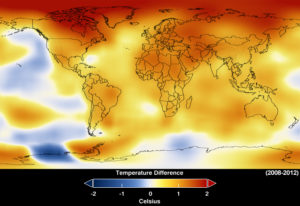American politics over the next 18 months will help decide the fate of earth’s environment, said a panel of environmental experts today at Cleveland’s Huntington Convention Center.
Christine Whitman, former Republican governor of New Jersey and former Administrator of the United States Environmental Protection Agency; Dr. David Orr, Professor of Environmental Studies and Politics at Oberlin College; and Shanelle Smith, Ohio State Director for the Trust for Public Land were the panelists at the City Club’s 2019 State of the Great Lakes presentation on Friday, June 21.
“The state of our democracy and the state of the earth are linked,” said Orr. We are not going to be able to solve our environmental problems unless we address our political problems.

The more northern we look, the more Earth is warming, as shown by this NASA image.
https://www.nasa.gov/topics/earth/features/2012-temps.html
America has made great progress in cleaning and protecting the environment in the past fifty years, said the panel. 1969 was a tipping point for America’s environment.
Awareness of the costs of unconstrained industrial pollution had been building since the 1962 publication of Rachel Carson’s book, Silent Spring. But a major oil spill in Santa Barbara, California in January 1969, and a fire on the Cuyahoga River in June of that year boosted public awareness and sparked a flurry of federal environmental legislation.
Within six months Congress passed the National Environmental Protection Act and before the end of 1974 Congress had created the Environmental Protection Agency, strengthened the Clean Air Act, and passed the Clean Water Act, the Endangered Species Act and the Safe Drinking Water Act.
Over the next decades dramatic progress was made in cleaning the nation’s air and water.
But that progress is now imperiled.
“We’ve made a lot of progress,” said former EPA Administrator Whitman. “But now we are starting to backslide.” The Trump administration’s large-scale rollback of environmental regulations is concerning. Whitman said she understood the need to review regulations to ensure their continued usefulness. “But to just do away with them because you don’t like them makes no sense.”
The early environmental acts were passed with the support of Democrats and Republicans and were signed by a Republican president, said Orr. “The environment wasn’t a partisan issue, it was a convergence issue, something that needed to be done.”
But now environmental regulations have become a partisan issue, he said. “Politically, we have to come together. This is the challenge of our time.”
Wittman said that the American public sees the importance of the issue, but the actions of the Trump administration are troubling. She called the refusal of Secretary of State Mike Pompeo to sign a final declaration at the Arctic Conference unless all references to climate change were removed “mind-boggling.” The Arctic, Wittman noted, is warming twice as fast as the rest of the planet.
“Without leadership from the top,” she said, “you are not going to get the necessary focus.”
Today, said Wittman, environmental issues like everything else, are viewed through a partisan political prism, not through a policy prism.
But while partisan differences are acute in Washington DC, said Orr, the American public is less divided on environmental issues than some people say. Polling data indicates that “Americans of both parties consistently support robust environmental policies. But the link between what we want as people, and what we get as policy is broken,” he said.
Whitman and Orr both believe that the 2020 election will be critical for the nation’s environment.
“This is the first election in my life when the environment will be a major issue,” said Whitman. “That is good.” She expects that the Green New Deal, proposed by Congressional Democrats, will spark significant debate.
“If we get an in-depth, intelligent discussion of what we need to do concerning the environment we will be where we need to be,” she said.
Orr said the upcoming election will determine if America’s politics are resilient enough to handle the crisis we are facing.
But citizens will need to force elected officials to address environmental issues, said the panelists. “Elected leaders won’t respond until the public demands it,” said Whitman, the former governor.
“Citizens need to make their voices heard,” said Smith.
So far, the public has not forced attention to the issues. “It is very difficult to get people to consider the cumulative impact of their individual behaviors,” said Whitman. “We need to get people together to agree that there is a problem, then we can start working together to solve it,”
Orr agreed that individual behavior is important. But the scale of the problem requires government action, as well. “The drivers of individual consumer behavior are conscience and public policy,” he said.
Many Americans do not appreciate the impact of the latest climate data, said Orr. “Citizens need to know their numbers.”
The latest data is alarming, said Orr. “If we were in an aircraft cockpit there would be warning lights flashing all over the place. But we don’t have a political warning system. We have a limited time to get a handle on this.”
We won’t be able to solve our environmental problems until we solve our political problems, said Orr. “This isn’t about making democracy great again. It’s about taking democracy to the next level, creating a democracy that works for everyone, democracy that is transparent, fair, decent, foresighted, and scientifically literate.”
“This process starts at the neighborhood level,” he concluded, “with us talking to each other.”
Global temperature anomalies averaged from 2008 through 2012
